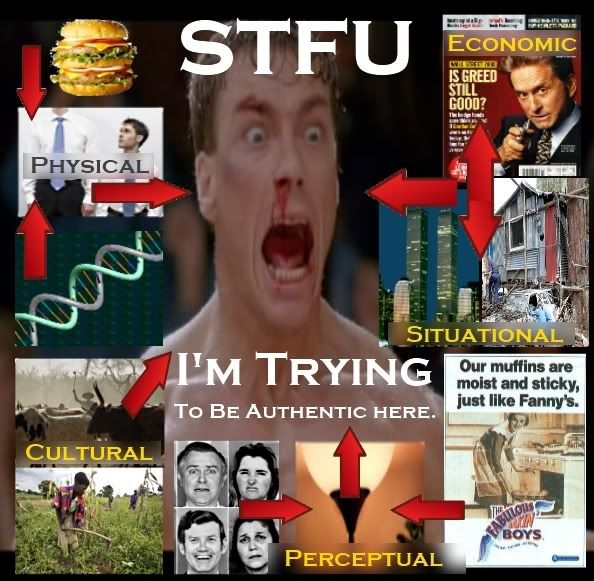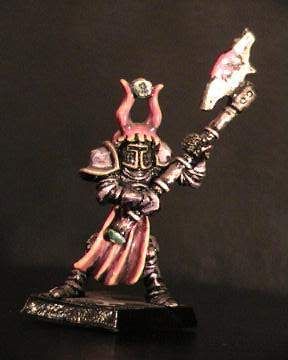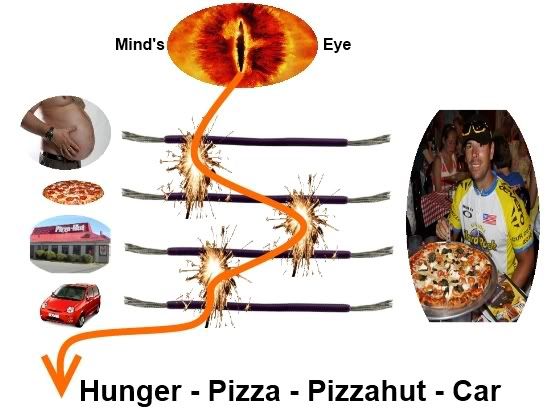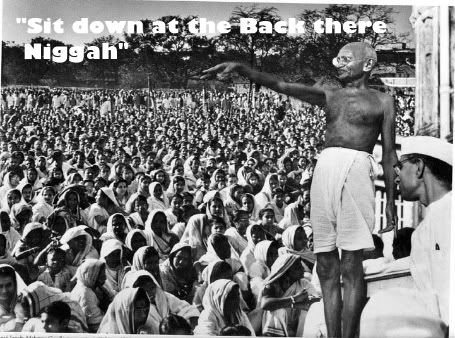In my book, Sartre's got a lot to answer for. His existentialist novels espousing the seed-crystals of every goddamn Disney-film plot in creation "Be true to yourself... Follow your heart Littlefoot... Just be yourself..." make me want to puke, for they have condemned a legion of tweedy-pipe-smokers to an unfulfilled existence of endless soul-searching for their 'authentic self' and guilt when they come up short and realise on their death beds that, despite their constant striving for something 'real' something 'different', they ended up pretty much like any other Joe Schmoe on the planet, or worse still, become convinced they simply strait-jacketed themselves into a life-long affectation, and lived only as a hollow antonym of Joe Schmoeism.
As we see, both definitions stress the need for a state of being distinguishable from the group, of being distinct, of not being a copy, and the philosophic slant on authenticity requires a certain purity, inviolate of outside influence.
Put very simply, in my view, true individualism is not something achievable by humanity, nor was it ever meant to be. And as for 'living authentically', well that particular crusade is absolutely doomed from the start, so pervasive are the external drivers of groupthink, and so numerous are the internal fifth-columnists that have infiltrated our bodies and brains over the millenia.
Before I move onto the more specific 'how', I'd like first to sketch out the 'why' of it all.
The Why.
Having become, however grudgingly, a certified member of the old bastard demographic I take some certain measure of solace in my new-found freedom to gently take the piss out of the more youthful sectors of society as they scramble about for some from of identity separate from the previous generations. It is a classic old-git story - the situation of the uniformed or otherwise conventually-dressed mid-lifer bumping into a bunch of spotty youths and having some form of the following conversation:
"Hey kids - whassup..?"
"Fuck-off Grandad."
"Aww -c'mon - Why so serious..?"
"You iz like a faceless slave to the establishment."
"Really, how can you tell..?"
"You iz like wearing the uniform of the drone dog-soldier of the oppressed."
"Really..? Damn, I quite liked this sweater too. So - not into uniformity huh..?"
"Shah - as if."
"Is that why you're all wearing black, like the same music and spout the exact same half-assed socio-politic rhetoric..?"
"Yea - it's like an expression of our individuality innit."
Young people. Priceless.
But why, since we seem to put such stock into being something unique, someone special, do we seem doomed never to achieve anything near it..? Simple, because true individuality is fatal. Or at least, fatal
enough.
Imagine a colony of ants. Or a hive full of bees. But not the normal kind, these bees are all individuals, so are the ants. None of them act as the others do. They dance to different beats, sniff to different scents, build to different plans. can you imagine what a completely fucked-up mess they'd be in..?
"Oi - where's that honey..?"
"Hey - don't stress man, Jamiroquai's on sabbatical in the South of France trying his feeler's at abstract pollenization."
etc.
Seriously though, humanity is based along the lines of a distributed super-organism - many acting as one - in much the same way as the eusocialities of Bees, Ants and Termites. Except bigger of course, and wearing jeans. It makes sense, as evolutionary gambits go, to go for two basic options: (
A) Big, solitary and (usually) fucking dangerous, aka - T-Rexes, sharks, bears, tigers - or, (
B) Smaller, communal, and comparitively weedy. The two gambits tend to become exclusive over time - because if you try to combine them either way they tend to either fail outright, or become hugely inefficient. ie. A lone but weedy and totally undangerous predator will keep getting his ass handed to him by every Wildebeast he tries to take down, until he dies of starvation, and the communal but massively dangerous/agressive/deadly shark-rabbit will tend to kill itself off every season.
We of course, are examples of
B. So why did we end up dominating the world..? Us and not the Sharkbears..?
Because we co-operate. We become of one mind, one purpose. Some huge and many-armed Kali, a sword in each hand, raining down death and destruction all around, for as long as we can keep it all together and not run away in different directions. Evolution may have spent a long time making us intelligent, making us inventive and selfish and quarrelsome and curious and stubborn, but it's spent an equally long time keeping that intelligence and that self-centredness in check, ensuring that when push comes to shove, especially if the pushing and shoving is being done by a sharkbear, we pull together and work as one to kick our enemy's furry behind.
As much as an apparant individuality has been fostered during our meandering path from the trees into the city, it has also been supressed by our need to act, and think, as one.
I think that's probably enough 'Why' for starters.
The How.
Some people collect butterfies. Some people collect the numbers of trains they've stood on rainswept and dreary platforms especially to see. Some still sadder people, like me for instance, collect web-pages of cog-sci and sociology articles on human synchonicity mechanisms.
That's just the way I roll.
Anyway - remember the philosophic definition of 'authenticity'..?
"encountering external forces, pressures and influences which are very different from, and other than, itself"
Here is a quick round-up of the forces external and internal, operating upon us.
Perceptual.
How our body is feeling effects how we act.
http://www.jdnews.com/articles/span-79872-affects-study.html. Basically Over a series of studies, scientists found that they could easily manipulate people's feelings and perceptions based on nothing more than what the subjects were touching. Holding heavier objects, for instance, made men think more seriously about things, which in turn made them more likely to donate money to charity if asked. Men holding lighter objects were less likely to donate to charitable causes. People handling rough objects were more likely to see neutral social situations in a bad light, saying that other people were obviously in a bad mood. Perhaps the most shocking find was that your hands didn't have to be the things doing the touching. People who sat in hard chairs were more likely to maintain a hard line in negotiations and were less receptive to their partner's way of thinking.
[cracked.com].
ie. People in similar physical locations, carrying similar objects, wearing clothes cut of a similar cloth... Would tend to exhibit similar perspectives.
Our own facial expressions, and those of others around us, directly effect our emotions and our ability to feel them. Courtesy of our mirror-cells, we internally 'copy' the emotions of those around us. See someone smile brightly, or laugh, and suddenly you feel a little smilier and laughier yourself, despite however much of a gloomy bastard you may believe yourself to be. But you know this. You're yawning, oops - damn , now so am I - those infectious expressions again. Anyway, more surprising still
http://www.msnbc.msn.com/id/37861005 scientists found that those with faces more or less rendered imobile via botox couldn't experience the same degree of emotional response as others with 'normal' facial motility. Do people scowl all the time beacuse they are 'authentically' dour, or are they dour because they scowl all the time..? How would you know..?
ie. People in proximity would tend to gravitate toward an averaged emotional state.
Cultural:
Too many to list here really.
Ancestory: In Outliers by Malcolm Gladwell he talks about how the general professions of your ancestral groups cause knock-on effects many generations later. The two main groups are those who stem from herders and farmers. Those with herder backgrounds, even if the modern cultural standards denigrate casual agression, are far more agressive and far more quick to anger than those with farmer backgrounds.
Situational: "The Lucifer Effect" by the guy who conducted the Stanford Prison experiment pretty much demonstrates beyond doubt that stereotyped stressful situations impose behavioural norms - massively altering people's apparant personas very quickly. He managed to turn a bunch of student libertarian hippies into authority-mad sadists within days. He was further vindicated during an investigation into the abuses in Abu Ghraib POW prison.
ie: People in similar situations, especially if the roles usually played out within them are known (and socially approved) will act (usually) as is expected, whatever pre-existing personal characteristics they may have professed to prior.
Status:
http://www.msnbc.msn.com/id/35836844/ http://blogs.discovermagazine.com/notrocketscience/2010/04/27/power-breed-hypocrisy-%E2%80%93-the-powerful-judge-others-more-harshly-but-cheat-more-themselves/ http://www.psychologicalscience.org/media/releases/2008/vankleef.cfm http://scienceblogs.com/observations/2010/04/does_money_lessen_pain.php
It would seem that increased social status lends a whole plethora of characteristic traits, everything from a reduced abilty to feel pain, to hypocrisy, a talent for lying, and a reduction in your ability to feel compassion.
ie. Social status to some extent synchonizes personality type.
Language:
http://www.cracked.com/article_18823_5-insane-ways-words-can-control-your-mind.html The language you speak would seem to impose certain perspectives and traits upon you, whether you like it or not.
Priming:
http://en.wikipedia.org/wiki/Priming_%28psychology%29
Priming is thought to play a large part in the systems of stereotyping[30]. This is because attention to a response increases the frequency of that response, even if the attended response is undesired[30][31]. The attention given to these response or behaviours primes them for later activation[30].
This can occur even if the subject is not conscious of the priming stimulus[30]. An example of this was done by Bargh et al. in 1996. Subjects were implicitly primed with words related to the stereotype of elderly people (example: Florida, forgetful, wrinkle). While the words did not explicitly mention speed or slowness, those who were primed with these words walked more slowly upon exiting the testing booth than those who were primed with neutral stimuli[30]. Similar effects were found with rude and polite stimuli: those primed with rude words were more likely to interrupt an investigator than those primed with neutral words, and those primed with polite words were the least likely to interrupt[30]. A Harvard study showed that something as simple as holding a hot or cold beverage before an interview could result in pleasant or negative opinion of the interviewer[32].
In summary:
We move almost entirely within a world of understood information. Adverts, billboards, overheard conversations, editorials, TV programs - there is almost no avoiding it. We are constantly bathed in an all-pervading sea of suggestion. You don't notice really, unless you suddenly remove yourself from it. As I did.
One of my most clear memories of my early days in Turkey is of walking down the mainstreet for the first time. People walking, talking. Music blaring, billboards emblazoned with legends of every shape and size. And I could understand absolutely nothing of it. An immensely peaceful experience. Like walking in silence, alone. Even the facial expressions of the crowd were altered subtley, the framework of bone beneath ever-so-slightly alien.
The second is of coming home, after a year of meditative non-understanding, to travel across London on the Tube. Surrounded by people talking English on their phones, surfaces plastered in stickers, newspaper headlines and book-titles on every side. I felt literally brain-raped.
There is no neutral state of being anymore. Our information-rich society no longer allows it.
Again, enough of the 'how' for now. It's late.
In summary - In my opinion, it is impossible to be 'authentic' beacuse we as a species were never geared to form a true individuality of character (upon which to build authenticity) in the first place, as individual interests conflict with group survival during direct confrontations with other groups/predators. Doublely so now in our modern world it becomes impossible to form/maintain individuality due to the twin norms of high population density in urban areas - leading to high levels of active/passive informational exchange between people, and the general and pervasive background informational overload courtesy of modern media and the net.
Once upon a time, when I wasn't so old and wrinkley, I used to frequent a nightclub called the Cookie-Club in Nottingham. It was small, and had a great Goth-night on Wednesdays. One of my favourite songs of the time was The Cult's
She Sells Sanctury. Anyway, to get the DJ to play it, among other things, I'd locate the most beautiful woman in the club, rush up to her and shout (it was a loud club): "S'cuse me, I need your help." What would follow would be a quick sob story about trying to get a song played - but that I'd told the DJ it was for her birthday - having pointed her out (at random) to him as my girlfriend, and that I needed her to go over there with me, and tell him it was true.
Okay, lame factor high. But it worked as an opening event, more often or not. Better than "do you come here often" anyway. The general aura of
rush was key, plus the requisite arm-flapping, and boyish smiling.
What's that got to do with anything..? Aha.
Above I proposed that true individuality was impossible, because of the constant barrage of outside influences worming their wicked ways into our forebrains. However that isn't really the death-knell for individuality per-se. We could think of ourselves, as 'individuals', as being metaphysic DJ's. Okay, so we don't create the music we play, but maybe that doesn't matter - we've all been to clubs, and know that a good DJ puts his own spin on the records he plays - the sequencing, the fades in and out, the quicks, the slows, the DJ can make a good night a great one, or equally, really fuck everything up. ie,
he manages to express his individuality, musically, despite not actually composing any.
That would be all well and good, and I'd obviously now have to admit defeat, were it not for people like 80's-Goth me, constantly pissing the metaphysic DJ off with stupid requests for a fictional (but perhaps not for long) girlfriend. To the point where the poor bastard DJ is so swamped with people clamouring for "I did it my way" and "Ra-Ra-Rasputin" that whatever record he eventually plays, he's no longer sure whether he chose it himself, or some other son of a bitch just shouted it in his ear a moment ago.
I don't want to turn this into a free-will/determinism debate. So I won't. But I will just point something out, something possibly quite fatal to the position of achievable authenticity. It is the assumption made, right off the bat: Logically, for a person to attempt to live an authentic life,
they must have some fairly concrete idea of who they are. That old "know thyself" chestnut.
But I don't think we do.
Of course, however - we all
say we do.
A long time ago, there was a guy I knew, a psychologist.. Mad as a hatter, apt to shout a lot. But one thing he said I took to heart, he said "do not listen to what people say, as much as watch carefully what they
do." So I break people up now, in general, into a 'narrative self' - this being the person they say they are, and a 'behavioural self' - the person they demonstrate themselves to be. Afterall, which would you trust..?
"Hey mate - do you know who you are..?"
"Well, duh, of course I do - I'm blah, from blah, I'm a practicing blah, and believe blah, I work as a blah, I'm blah, blah and blah."
They say. But despite that, let us look at what we
do. Flop open any glossy magazine and you're almost certain to find a quiz along the lines of "How X are you..?" The X being sometimes 'honest' sometimes 'monogamous' and sometimes, I dunno, 'fun at parties'. Look at the net - how many IQ tests are there..? And don't tell me you've never done one. You do the quiz, you get points. An exact figure. You are Y clever, you are Z honest. Does my bum look big in this..? - you ask your friend.
Why don't you know..? It's
your brain, and
your bum. Why do we seem to need these tests..? These second opinions..?
Because we have no real fucking idea of who we are, in any concrete, exact sense.
And why..? Well that's simple,
our perceptions do not work on exact figures, but on comparatives. I do not know instinctively that I am 1.81 metres tall, but I do know that I'm taller than Paul, and shorter than Bill. Likewise I know I'm smarter than Phil, but not as sharp as Audrey. This state of comparitive-based knowledge permeates everything. Can you imagine a world where everyone knew themselves, their capabilities, exactly...?
"And yes, the contestants are lining up for the men's Olympic 100m finals. Now they are each telling each other how fast they can run. And it's over, the Canadian runner says he can run a 100m in 9.56 seconds. An amazing victory for Canada."
But we do not, so we run our races, take our tests, ask for the opinions of friends, write what we have
done on our resumés, rather than what we say we are capable of, what we think we would do in situation X. Whenever we tell someone, including ourselves, what we are, we confabulate. We aren't sure.
Is Jack hardworking because he's ambitious, or has he become ambitious because finds his penchant for hard work allows him to be so..? And just how hard
does he have to work anyway, to work 'authentically' hard..? Does he smoke because he likes to..? How many cigarettes in a day before he's smoking 'authentically'. Who knows..? Not me, and certainly not Jack either.
Hard to find yourself when you don't even have a map.
One question I have failed to raise so far is ironically the most obvious: "Why, if we are not individuals, do we appear as such..?"
I mean, go outside, watch everyone. They all seem different - they talk differently, have different opinions, do different things, at different times, make different choices even though they are in the same sitiuations. To see all this and still say that people have no real individuality is either madness, or at the very least, unintuitive.
Sorry, but here I go back to the lowly bee. The same bee that I introduced earlier. Watch a hive. All the bees are buggering about in a seemingly random fashion, much as we do. Let's lower the temperature of the hive just a little bit. A degree or two. Brr.
Look, look there - Bee number 144,735 has begun to buzz its wing furiously. Damn him, he's trying to re-heat the hive back to its normal homeostatic temperature. Hah-ha - do not fuck with me bee, I will now lower the temperature a few degrees more. Hmm. Now
more Bees are all beginning to buzz their wings.
Arrgh - down with the resistance..!!! - I now lower the temperature even lower, to the point where it's bumping up against the lower limit of what bees can stand before dying.
Boom - the whole hive is buzzing furiously - a million teeny-tiny muscles pumping furiously - converting movement into heat.
A minute ago however, they were all doing their own things. Apparently individually. And now they're all acting in concert, effortlessly. Naturally.
Hmm.
Why..? Why didn't they all start buzzing like crazy all at once when I first lowered the temperature by a degree or two..? That would have restored the correct temperature quicker afterall...
...Actually, no it wouldn't have. It would have overshot it by a mile, then the poor bastards would have had to clear out until the hive cooled down, or at least remain torpid for a while. Then the hive would have cooled, and damn, gotten
too cool, then they'd all have started buzzing crazily again, and the whole overshoot-undershoot cycle would have begun again, never actually, to stop, and they'd never get anything done.
Giving each bee a different threshold of "Ooh, isn't it getting a bit chilly in here..?" makes evolutionary sense, because it ensures a
stepped response to temperature, ensuring that a homeostatic level is maintained - a reaction of near equal strength to a given provocation.
Now, let's transpose that thought onto human behaviour. Say there is a fire. It's no more than a burning cigarette-butt thrown from a car. It lands, still smoldering, in front of a group of people. What happens..? Do they:
(a) All shout "FIRE!!!!" and climb over themselves to either run away, or to stamp it out - probably squashing each other in the process..?
Or does:
(b) Whoever's closest grind it out and go "Tut-tut, people today eh..?".
ie. the most efficient level of response given the magnitude of the event.
However, now, if that cigarette lands on a bunch of trash, and the trash catches fire...
Then you get collective action - people trying to put it out - bucket chains for example, people phoning the fire department. People grabbing each other and saying "Oh look - there's a fire."
Same with agression and mob-behaviour. First, to produce a mob, you have to synchronize their mood. Do that with a good firey speech concerning a common grievance, then mirror-cells, collective body-language and facial expression will do the rest. Bingo, one synchronized, collectively angry mob. Now you take them on the warpath, and find someone to fight, or something to break.
Damn. Police line.
Now watch. Look - there's the first bee, oops, I mean person, throwing a rock. The police close in. Look again - a couple more people have been pushed over the "Goddamnit I'm so angry I could spit" threshold, and they are piling in. And boom - there goes the crowd. Everyone wailing in, fists, curses, and spittle flying.
It's all about thresholds. A coward isn't always a coward, it's just they have a very high tolerance for affront. Give that guy enough provocation though, and suddenly he's trying to bite through your leg along with the rest of them.
Acting individually doesn't mean you are an individual.
We can expand mob behaviour. Call it a "diffuse localized harmony of behaviour and perspective". ie, a wider society, with the mob's firey speech lessened into a general cultural background hum, specific to that area,
tailored to the specific needs of surviving happily in that location along with the accompanying accent.
And that's the trouble these days, a new technological advance that's screwing up even that localized group individuality (sorry - now it's my turn to be oxymoronic), the globalized media. For example.
Black rap culture - (massively stereotyped sorry) - as smack your bitch, get into gangs, sell drugs, baby-mothers and all that unjazz, does kinda work (for the males anyway). As long as you stay in the ghetto. Inherrent, and to some extent subliminal, racism in American white culture - for example simply having a black-sounding name results in a statistically lower chance of getting a job, even without a picture, or any other context - means blacks are sidelined into unemployment and crime. With normal avenues of social advancement cut - ie. employment, promotion or higher education - it begins to make sense to explore criminal avenues, a risk taken being better than just sitting on your hands and rotting. And with a significant portion of suitable males in prison or dead, the black women are sexually disempowered, competing as they are among themselves, for a smaller pool of males - forcing them to accept chauvanistic and self-seeking behaviour on the part of those males, even to the point of bearing their children without the normal contracts and pledges... etc. etc. etc.
My point however is that without the net, and instant world-wide communication, this culture would have stayed pretty much within its borders for a lot longer and worked there to some kind of end-point, good, or more probably bad, whatever. But now - because that culture is a 'first order' culture - ie. sex, violence and money - and as such is vastly and instinctively attractive to the young and impulsive - ie. pretty much all male teenagers worldwide - it has exceeded its natural bounds and gone viral - igniting the youth of the world - white, black, and all colours in between.
Trouble is though, you've got nice white rich kids with educations trying to out pimp each other and hook their equally nice, educated and emancipated female colleagues on drugs so they can prostitute them out on Youtube.
In ending, I accept that obviously this is an extreme, and to some extent willfully exaggerated example, but it serves to illustrate my final point, that as the world becomes ever more interconnected, so, inversely, our chance of preserving an authentic identity at both an individual and a localized group level lessens, as our psyches become flooded not only with the influences of our native cultures, but also those of invading cultural memes, carried via the mediums of the TV and the net.





































